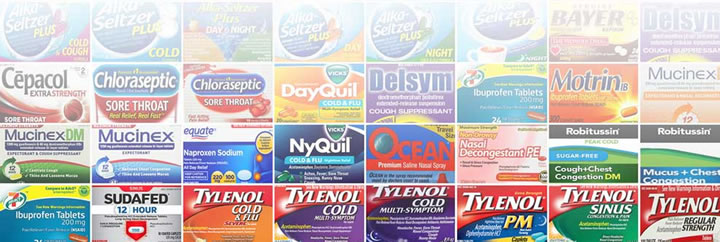Look for a few simple, inexpensive ingredients
Most cases of the flu do not require visits to the emergency room or even your local doctor. But there are a few OTC flu medicines that can help treat the most common symptoms: fever, headache, sore throat, pain and a cough.
You don’t need to spend a lot of money, and these products can be used for other illnesses, too. These are basic medicines that everyone should have in their medicine cabinet for emergencies.
Choose the right medication for the symptom
Fever reducers
- Aspirin, ibuprofen and acetaminophen treat fevers. A fever is simply a sign of the body’s defense mechanism in action.
- Do not give aspirin to infants and/or toddlers.
Pain relievers for headache, sore throat or muscle pain
- Aspirin, ibuprofen and acetaminophen all treat pain, as well as fever.
- Acetaminophen works well for headaches, and doesn’t cause stomach discomfort like ibuprofen or aspirin can.
- Ibuprofen, naproxen or aspirin work best for sore throats or muscle pain.
Cough suppressants
- Dextromethorphan is the main ingredient in cough suppressants. It works by decreasing the feeling that you need to cough. Be careful as it can cause slight drowsiness, so it’s best to take it before bedtime.
Avoid these ingredients when treating the flu
Flu is a lung virus. If you have a stuffy, runny nose and a sinus headache, it’s more likely a cold or allergy.
You probably won’t need products with:
- Decongestants, such as phenylephrine, oxymetazoline, or pseudoephedrine
- Antihistamines (for allergies), such as diphenhydramine, fexofenadine, loratadine, cetirizine or chlorpheniramine
- Expectorants, cough syrups that work by thinning and loosening the mucus in your airway (a flu cough is usually dry, not goopy); Guaifenesin is the most common expectorant.
Always read the labels, directions provided and consult your physician before taking any medication.
